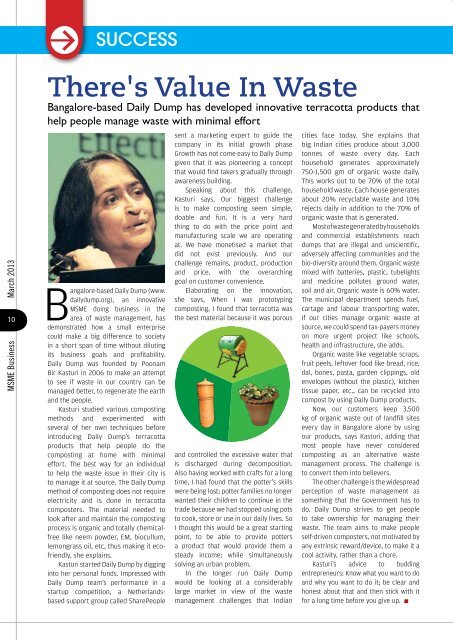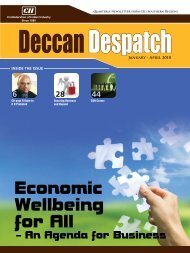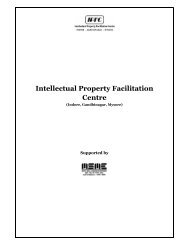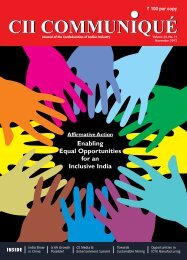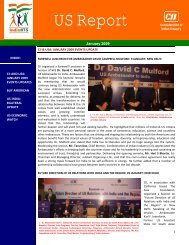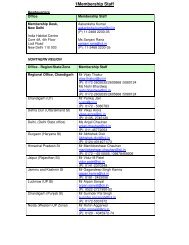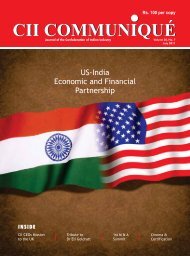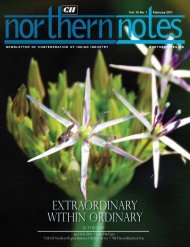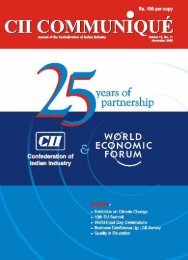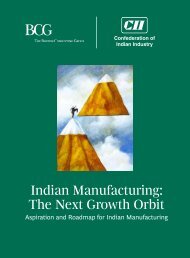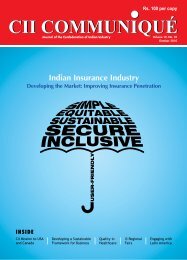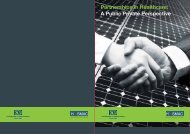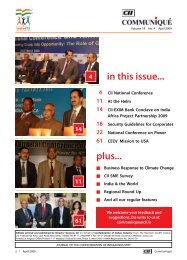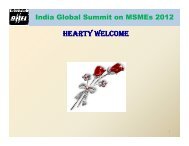SUCCESSMSME <strong>Business</strong> <strong>March</strong> <strong>2013</strong>10There's Value In WasteBangalore-based Daily Dump has developed innovative terracotta products thathelp people manage waste with minimal effortBangalore-based Daily Dump (www.dailydump.org), an innovativeMSME doing business in thearea <strong>of</strong> waste management, hasdemonstrated how a small enterprisecould make a big difference to societyin a short span <strong>of</strong> time without dilutingits business goals <strong>and</strong> pr<strong>of</strong>itability.Daily Dump was founded by PoonamBir Kasturi in 2006 to make an attemptto see if waste in our country can bemanaged better, to regenerate the earth<strong>and</strong> the people.Kasturi studied various compostingmethods <strong>and</strong> experimented withseveral <strong>of</strong> her own techniques beforeintroducing Daily Dump's terracottaproducts that help people do thecomposting at home with minimaleffort. The best way for an individualto help the waste issue in their city isto manage it at source. The Daily Dumpmethod <strong>of</strong> composting does not requireelectricity <strong>and</strong> is done in terracottacomposters. The material needed tolook after <strong>and</strong> maintain the compostingprocess is organic <strong>and</strong> totally chemicalfreelike neem powder, EM, biocullum,lemongrass oil, etc, thus making it ec<strong>of</strong>riendly,she explains.Kasturi started Daily Dump by digginginto her personal funds. Impressed withDaily Dump team's performance in astartup competition, a Netherl<strong>and</strong>sbasedsupport group called SharePeoplesent a marketing expert to guide thecompany in its initial growth phaseGrowth has not come easy to Daily Dumpgiven that it was pioneering a conceptthat would find takers gradually throughawareness building.Speaking about this challenge,Kasturi says, Our biggest challengeis to make composting seem simple,doable <strong>and</strong> fun. It is a very hardthing to do with the price point <strong>and</strong>manufacturing scale we are operatingat. We have monetised a market thatdid not exist previously. And ourchallenge remains, product, production<strong>and</strong> price, with the overarchinggoal on customer convenience.Elaborating on the innovation,she says, When I was prototypingcomposting, I found that terracotta wasthe best material because it was porous<strong>and</strong> controlled the excessive water thatis discharged during decomposition.Also having worked with crafts for a longtime, I had found that the potter's skillswere being lost; potter families no longerwanted their children to continue in thetrade because we had stopped using potsto cook, store or use in our daily lives. SoI thought this would be a great startingpoint, to be able to provide pottersa product that would provide them asteady income; while simultaneouslysolving an urban problem.In the longer run Daily Dumpwould be looking at a considerablylarge market in view <strong>of</strong> the wastemanagement challenges that Indiancities face today. She explains thatbig Indian cities produce about 3,000tonnes <strong>of</strong> waste every day. Eachhousehold generates approximately750-1,500 gm <strong>of</strong> organic waste daily.This works out to be 70% <strong>of</strong> the totalhousehold waste. Each house generatesabout 20% recyclable waste <strong>and</strong> 10%rejects daily in addition to the 70% <strong>of</strong>organic waste that is generated.Most <strong>of</strong> waste generated by households<strong>and</strong> commercial establishments reachdumps that are illegal <strong>and</strong> unscientific,adversely affecting communities <strong>and</strong> thebio-diversity around them. Organic wastemixed with batteries, plastic, tubelights<strong>and</strong> medicine pollutes ground water,soil <strong>and</strong> air. Organic waste is 60% water.The municipal department spends fuel,cartage <strong>and</strong> labour transporting water.If our cities manage organic waste atsource, we could spend tax-payers moneyon more urgent project like schools,health <strong>and</strong> infrastructure, she adds.Organic waste like vegetable scraps,fruit peels, leftover food like bread, rice,dal, bones, pasta, garden clippings, oldenvelopes (without the plastic), kitchentissue paper, etc., can be recycled intocompost by using Daily Dump products.Now, our customers keep 3,500kg <strong>of</strong> organic waste out <strong>of</strong> l<strong>and</strong>fill sitesevery day in Bangalore alone by usingour products, says Kasturi, adding thatmost people have never consideredcomposting as an alternative wastemanagement process. The challenge isto convert them into believers.The other challenge is the widespreadperception <strong>of</strong> waste management assomething that the Government has todo. Daily Dump strives to get peopleto take ownership for managing theirwaste. The team aims to make peopleself-driven composters, not motivated byany extrinsic reward/device, to make it acool activity, rather than a chore.Kasturi's advice to buddingentrepreneurs: Know what you want to do<strong>and</strong> why you want to do it; be clear <strong>and</strong>honest about that <strong>and</strong> then stick with itfor a long time before you give up.
Strategy<strong>Business</strong> Plan: Must for SMEMaking a business plan plays a pivotal role in the success <strong>of</strong> the firm <strong>and</strong> thus needsto be followed with a scientific approachIn today's highly competitive <strong>and</strong>ever-changing market conditions, itis vital for businesses to define theirobjectives, develop strategies, forecastgrowth <strong>and</strong> plan for contingencies. Inother words, create a solid business plan.So what is a business plan <strong>and</strong> why is ituseful for SMEs?A business plan outlines the roadmapto achieve both long <strong>and</strong> short termbusiness objectives. This documentalso states a company's vision, mission<strong>and</strong> financial goals. A plan helps tonot only sharpen business focus <strong>and</strong>prioritize actions, but also gauge actualperformance against business goals.ForAn SME, having a structured businessplan serves two significant objectives:The first objective is to presentbusiness details <strong>and</strong> strategies to externalaudiences prospective investors, financialinstitutions etc. to generate funding,which is essential for growth <strong>and</strong> smoothfunctioning <strong>of</strong> the business.The second objective is to keep theorganizational workforce updated aboutthe future plans <strong>and</strong> goals, <strong>and</strong> theroadmap to achieve these. This helpsin steering the organization towardsits objectives by keeping the businessentrepreneur <strong>and</strong> all the employeesaligned in the same direction. In addition,well-devised business plans provide anoperational framework that allows thebusiness to enjoy distinct competitiveadvantages. This, in turn, results inincreased pr<strong>of</strong>its.How does one create a business plan<strong>and</strong> what should it contain?Making a business plan also plays apivotal role in the success <strong>of</strong> the firm <strong>and</strong>thus needs to be followed with a scientificapproach. Below are the key components<strong>of</strong> a good business plan <strong>and</strong> how oneshould go about developing it :1. Executive Summary: The summaryshould be the reflection <strong>of</strong> the business<strong>and</strong> should help reader to underst<strong>and</strong> thekey facts about the business at a glance.The summary should be kept short, crisp<strong>and</strong> clear. It should fit in a page, unless <strong>and</strong>until some key information such as capitalstructure, prime events etc. have to bementioned. Ideally, this is the section thatwill be made last, after all the followingsections are done.2. Vision, Mission business structure<strong>and</strong> promoter background : This section iswhere you outline your business vision <strong>and</strong>mission clearly, e.g. To become the leadingsupplier <strong>of</strong> springs to the automotiveindustry for a spring manufacturer, or Toprovide the most authentic Chinese cuisinein New Delhi for a Chinese restaurantbeing set up in New Delhi. You should alsogive a description <strong>of</strong> how your businessis structured, i.e. the legal structure (asole proprietorship, a partnership or acompany), <strong>and</strong> a brief description <strong>of</strong> thebackground <strong>of</strong> the promoters education,work experience, etc3. Market sizing, growth prospects <strong>and</strong>competition Firstly, you should define themarket in terms <strong>of</strong> size, structure, growthprospects, <strong>and</strong> other trends. After that,you should list out the key competitorsin the market, <strong>and</strong> an assessment <strong>of</strong> theirrelative strengths <strong>and</strong> weaknesses as well.Many times, you might be able to obtainindustry <strong>and</strong> market data from differenttrade bodies (e.g. <strong>CII</strong>, FICCI, Assocham)or Government agencies <strong>and</strong> institutionsspecially tasked for this (e.g. SIDBI)4. Products <strong>and</strong> Services: This sectioncontains the description <strong>of</strong> the products<strong>and</strong> services that the business will supplyto its customers. Your product pricingshould also be included here5. Sales <strong>and</strong> Marketing: In thissection, you should detail out your sales<strong>and</strong> distribution plans, e.g. which cities/localities will you set up a branch ifnecessary, will you appoint your ownsales force or agents, or is it just directmarketing to businesses, etc6. Operations: This section detailsout the manufacturing process or servicedelivery process <strong>of</strong> the business, includingwhat equipment/machinery will be used, etc7. Organization structure : Here,you should detail out the organizationstructure, roles <strong>and</strong> responsibilities <strong>of</strong>senior management <strong>and</strong> the overallmanpower requirements.8. Financials: The trickiest part comestowards the end, as it is interlinked toall the past steps <strong>and</strong> leads to financialstatements such as Income statement,cash flow statement <strong>and</strong> balance sheet.This section is the backbone <strong>of</strong> the planas the overall capability <strong>of</strong> the businessis mirrored here. Sound financials arekey to raising capital in the form <strong>of</strong>equity or for obtaining loans. If the planis for an existing business, then you willhave to provide historical data as well asfuture projections.How <strong>of</strong>ten does the business plan needto change?A business plan is valid only for a finiteperiod <strong>of</strong> time, i.e. 1-2 years at best. Forthe plan to be effective, it needs to bereviewed regularly, as certain strategiesmight require changes to adapt tochanging market conditions.Some sections <strong>of</strong> the plan, such asmarketing plans, pricing, product <strong>and</strong>service features, etc., change in sync withchanging external factors.However, other sections like thecore business model are less likely tochange <strong>of</strong>ten.Getting help Of course, all this mayseem daunting at first sight! But youwill realize the benefits <strong>of</strong> building abusiness plan in a structured manneras it forces you to think through allthe aspects <strong>of</strong> the business somethingwhich you may not have done before.Also, one can take pr<strong>of</strong>essionalhelp here as well. There are manyChartered Accountants <strong>and</strong> otheradvisors who can help you with this;another option is to ask your financepartner (bank or NBFC) who may bedoing this as a value added service toSMEs (Read more about choosing yourright finance partner here).Kavi Arora is Managing Director & Chief Executive Officerat Religare Finvest Limited Managing the <strong>Small</strong> <strong>and</strong>Medium <strong>Enterprise</strong>s (SME) focused commercial lendingbusiness. For any suggestions <strong>and</strong> feedbacks related tothe article kindly write to marketing.rfl@religare.comMSME <strong>Business</strong> <strong>March</strong> <strong>2013</strong>11


